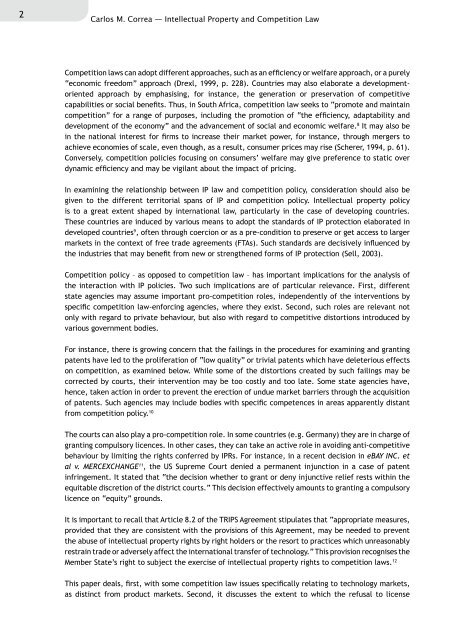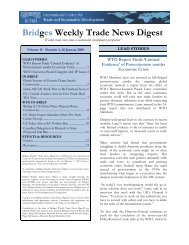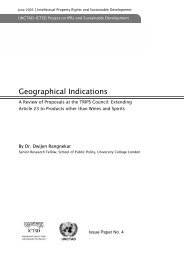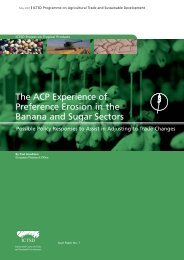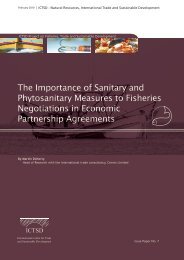Intellectual Property and Competition Law - IPRsonline.org
Intellectual Property and Competition Law - IPRsonline.org
Intellectual Property and Competition Law - IPRsonline.org
You also want an ePaper? Increase the reach of your titles
YUMPU automatically turns print PDFs into web optimized ePapers that Google loves.
Carlos M. Correa — <strong>Intellectual</strong> <strong>Property</strong> <strong>and</strong> <strong>Competition</strong> <strong>Law</strong><strong>Competition</strong> laws can adopt different approaches, such as an efficiency or welfare approach, or a purely“economic freedom” approach (Drexl, 1999, p. 228). Countries may also elaborate a developmentorientedapproach by emphasising, for instance, the generation or preservation of competitivecapabilities or social benefits. Thus, in South Africa, competition law seeks to “promote <strong>and</strong> maintaincompetition” for a range of purposes, including the promotion of “the efficiency, adaptability <strong>and</strong>development of the economy” <strong>and</strong> the advancement of social <strong>and</strong> economic welfare. 8 It may also bein the national interest for firms to increase their market power, for instance, through mergers toachieve economies of scale, even though, as a result, consumer prices may rise (Scherer, 1994, p. 61).Conversely, competition policies focusing on consumers’ welfare may give preference to static overdynamic efficiency <strong>and</strong> may be vigilant about the impact of pricing.In examining the relationship between IP law <strong>and</strong> competition policy, consideration should also begiven to the different territorial spans of IP <strong>and</strong> competition policy. <strong>Intellectual</strong> property policyis to a great extent shaped by international law, particularly in the case of developing countries.These countries are induced by various means to adopt the st<strong>and</strong>ards of IP protection elaborated indeveloped countries 9 , often through coercion or as a pre-condition to preserve or get access to largermarkets in the context of free trade agreements (FTAs). Such st<strong>and</strong>ards are decisively influenced bythe industries that may benefit from new or strengthened forms of IP protection (Sell, 2003).<strong>Competition</strong> policy – as opposed to competition law – has important implications for the analysis ofthe interaction with IP policies. Two such implications are of particular relevance. First, differentstate agencies may assume important pro-competition roles, independently of the interventions byspecific competition law-enforcing agencies, where they exist. Second, such roles are relevant notonly with regard to private behaviour, but also with regard to competitive distortions introduced byvarious government bodies.For instance, there is growing concern that the failings in the procedures for examining <strong>and</strong> grantingpatents have led to the proliferation of “low quality” or trivial patents which have deleterious effectson competition, as examined below. While some of the distortions created by such failings may becorrected by courts, their intervention may be too costly <strong>and</strong> too late. Some state agencies have,hence, taken action in order to prevent the erection of undue market barriers through the acquisitionof patents. Such agencies may include bodies with specific competences in areas apparently distantfrom competition policy. 10The courts can also play a pro-competition role. In some countries (e.g. Germany) they are in charge ofgranting compulsory licences. In other cases, they can take an active role in avoiding anti-competitivebehaviour by limiting the rights conferred by IPRs. For instance, in a recent decision in eBAY INC. etal v. MERCEXCHANGE 11 , the US Supreme Court denied a permanent injunction in a case of patentinfringement. It stated that “the decision whether to grant or deny injunctive relief rests within theequitable discretion of the district courts.” This decision effectively amounts to granting a compulsorylicence on “equity” grounds.It is important to recall that Article 8.2 of the TRIPS Agreement stipulates that “appropriate measures,provided that they are consistent with the provisions of this Agreement, may be needed to preventthe abuse of intellectual property rights by right holders or the resort to practices which unreasonablyrestrain trade or adversely affect the international transfer of technology.” This provision recognises theMember State’s right to subject the exercise of intellectual property rights to competition laws. 12This paper deals, first, with some competition law issues specifically relating to technology markets,as distinct from product markets. Second, it discusses the extent to which the refusal to license


